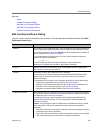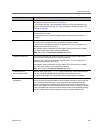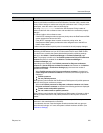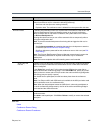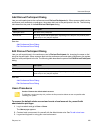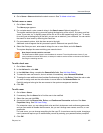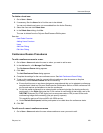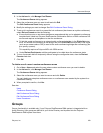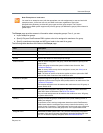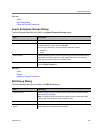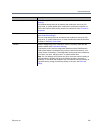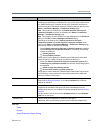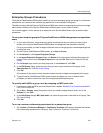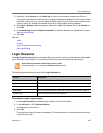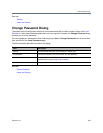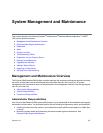
Users and Groups
Polycom, Inc. 330
The Groups page provides access to information about enterprise groups. From it, you can:
● Import enterprise groups.
● Specify Polycom RealPresence DMA system roles to be assigned to members of a group.
● Specify a conference template and MCU pool order to be used for a group.
The following table describes the fields on the Groups page.
Note: Enterprise vs. local users
You must be an enterprise user (with the appropriate user role assignments) to see and work with
enterprise users. A local user can only see other local users, regardless of user roles.
Microsoft Active Directory provides two group types and four group scopes. The Polycom
RealPresence DMA system supports only security groups (not distribution groups) with universal or
global scope.
Field Description
Group Name Name of the group, as defined in the Active Directory.
Description Description from the Active Directory.
Domain Name of the domain to which the group belongs.
Class of service Class of service assigned to the group, which determines the priority of the
group’s calls.
If none, the group receives the system’s default class of service. See
Conference Settings.
Note: A class of service may also be assigned to a user (see Users) or an
endpoint (see Endpoints).
Note: The class of service of the device applies to point to point calls. VMR
calls use the class of service of the conference room.
Conference Template Template assigned to the group, if any, which defines the conference
properties (or links to the Polycom MCU profile) used for its conferences. See
Conference Templates.
The template assignment can be made at the conference room, AD group, or
system default level.
MCU Pool Order MCU pool order assigned to this group, if any, which is used to determine
which MCU hosts a conference. See MCU Pool Orders.
The pool order assignment can be made at the conference room, AD group,
or system default level.
Territory Territory to which the group’s conference rooms (virtual meeting rooms, or
VMRs) are assigned.
A conference room’s territory assignment determines which RealPresence
DMA cluster hosts the conference (the primary cluster for the territory, or its
backup cluster if necessary). The assignment can be made at the conference
room level, the user level, the AD group level, or the system default level.
Assigned Roles RealPresence DMA system roles, if any, that are automatically assigned to
members of this group (all users automatically have the Conferencing User
role; it’s not listed or explicitly assigned). See User Roles Overview.



